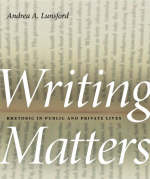
Writing Matters
Rhetoric in Public and Private Lives
Seiten
2007
University of Georgia Press (Verlag)
978-0-8203-2931-4 (ISBN)
University of Georgia Press (Verlag)
978-0-8203-2931-4 (ISBN)
- Titel z.Zt. nicht lieferbar
- Versandkostenfrei innerhalb Deutschlands
- Auch auf Rechnung
- Verfügbarkeit in der Filiale vor Ort prüfen
- Artikel merken
Helps us see that writing is not just a mode of communication, persuasion, and expression, but a web of meanings and practices that shape our lives. This work tells how the author has gained a respect for our digital culture's three v's - vocal, visual, verbal - while helping design and teach a course in multimedia writing.
Anyone who laments the demise of print text would find a sympathetic listener in Andrea A. Lunsford. Anyone who bemoans the lack of respect for blogs, graphic novels, and other new media would find her no less understanding. Lunsford is at home in both camps because she sees beyond writing's ever-changing forms to the constancy of its power to ""make space for human agency - or to radically limit such agency."" Lunsford is a celebrated scholar of rhetoric and composition, and many undergraduates taking courses in those subjects have used her textbooks. Here, she helps us see that writing is not just a mode of communication, persuasion, and expression, but a web of meanings and practices that shape our lives. Lunsford tells how she gained a new respect for our digital culture's three v's - vocal, visual, verbal - while helping design and teach a course in multimedia writing. On the importance of having a linguistically pluralistic society, Lunsford draws links between such varied topics as the English Only movement, language extinction, Ebonics, and the text messaging shorthand ""133t."" Lunsford has seen how words, writing, and language enforce unfair power relationships in the academy. Most classroom settings, she writes, are authority based and stress ""individualism, ranking, hierarchy, and therefore - we have belatedly come to understand - exclusion."" Concerned about the paucity - still - of tenured women and minority faculty, she urges schools to revisit admission and retention practices. These are tough and divisive problems, Lunsford acknowledges. Yet if we can see that writing has the power to help prolong or solve them - that writing matters - then we have a common ground.
Anyone who laments the demise of print text would find a sympathetic listener in Andrea A. Lunsford. Anyone who bemoans the lack of respect for blogs, graphic novels, and other new media would find her no less understanding. Lunsford is at home in both camps because she sees beyond writing's ever-changing forms to the constancy of its power to ""make space for human agency - or to radically limit such agency."" Lunsford is a celebrated scholar of rhetoric and composition, and many undergraduates taking courses in those subjects have used her textbooks. Here, she helps us see that writing is not just a mode of communication, persuasion, and expression, but a web of meanings and practices that shape our lives. Lunsford tells how she gained a new respect for our digital culture's three v's - vocal, visual, verbal - while helping design and teach a course in multimedia writing. On the importance of having a linguistically pluralistic society, Lunsford draws links between such varied topics as the English Only movement, language extinction, Ebonics, and the text messaging shorthand ""133t."" Lunsford has seen how words, writing, and language enforce unfair power relationships in the academy. Most classroom settings, she writes, are authority based and stress ""individualism, ranking, hierarchy, and therefore - we have belatedly come to understand - exclusion."" Concerned about the paucity - still - of tenured women and minority faculty, she urges schools to revisit admission and retention practices. These are tough and divisive problems, Lunsford acknowledges. Yet if we can see that writing has the power to help prolong or solve them - that writing matters - then we have a common ground.
Andrea A. Lunsford is Louise Hewlett Nixon Professor of English and director of the Program in Writing and Rhetoric at Stanford University. She has written or coauthored fourteen books, most recently "The St. Martin's Handbook," fifth edition, and "Everything's an Argument."
| Erscheint lt. Verlag | 30.8.2007 |
|---|---|
| Reihe/Serie | Georgia Southern University Jack N. and Addie D. Averitt Lecture Series |
| Verlagsort | Georgia |
| Sprache | englisch |
| Themenwelt | Geisteswissenschaften ► Sprach- / Literaturwissenschaft ► Sprachwissenschaft |
| ISBN-10 | 0-8203-2931-2 / 0820329312 |
| ISBN-13 | 978-0-8203-2931-4 / 9780820329314 |
| Zustand | Neuware |
| Haben Sie eine Frage zum Produkt? |
Mehr entdecken
aus dem Bereich
aus dem Bereich
Das umfassende Standardwerk auf der Grundlage der aktuellen amtlichen …
Buch | Hardcover (2024)
Duden (Cornelsen Verlag)
35,00 €


